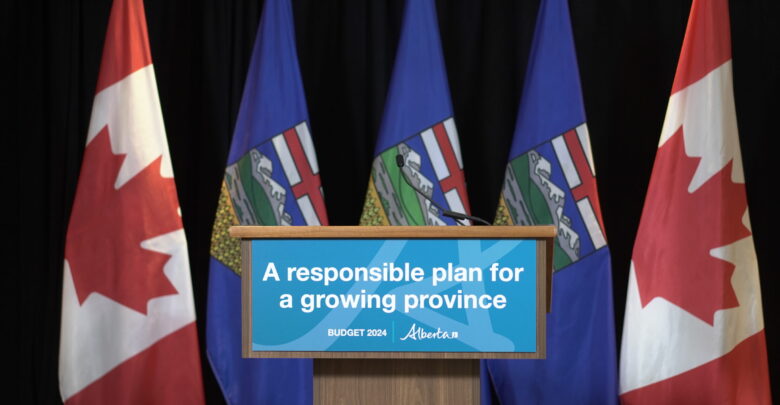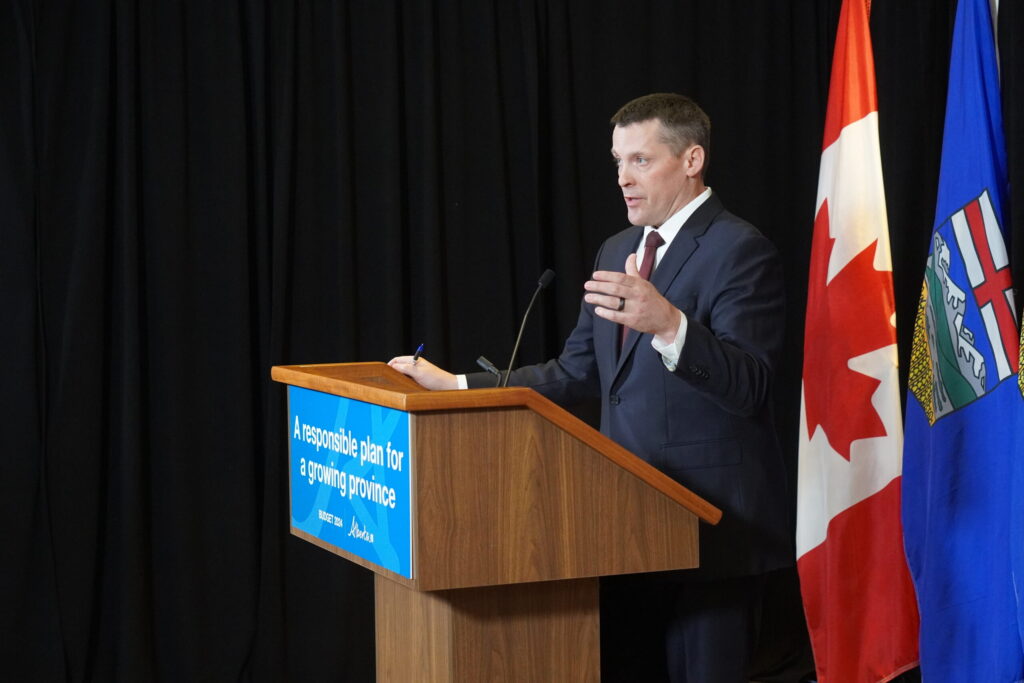BREAKING: Budget 2024’s impact on Alberta post-secondary education
Budget 2024, released on February 29, increases funding for post-secondary institutions' operating expenses, focuses on funding seats in high-demand areas, and addressing skill shortages.
 Lily Polenchuk
Lily PolenchukThe Government of Alberta’s Budget 2024 features investments in high-demand areas of labour and skill, an estimated $1.4 billion in student supports, and an increase in operating expense funding for post-secondary institutions (PSI). Minister of Finance Nate Horner said the theme of Budget 2024 is “a responsible plan for a growing province” in a press conference releasing the budget on February 29.
Budget 2024 outlines $71.1 billion in total expenses. As well, it outlines a forecasted surplus of $367 million. In Budget 2023, the budgeted surplus for 2024-25 was estimated at $5.2 billion. The forecasted surplus for 2025-26 and 2026-27 is $1.4 billion and $2.6 billion, respectively.
“With Budget 2024, we’re doing what every responsible Albertan would do,” Horner said. “We’re taking a hard look at our financial situation from all angles.”
“Our commitment to fiscal responsibility and our fiscal framework is ensuring we can sustain a strong Alberta.”
Budget 2024 outlines an estimated $6.3 billion operating expense for the Ministry of Advanced Education in 2024-25 — an increase of $189 million compared to the 2023-24 forecast. The estimated operating expense includes $2.5 billion in direct operating expense support toward Alberta PSIs.
Horner said that through Budget 2024, investments are being made “across the province to maintain Alberta’s competitive advantage” in the global economy.
“We need a responsible plan that will prepare us and our kids for whatever tomorrow may bring. A spending plan with the future in mind, making the most of every available dollar.”
$1.4 billion in post-secondary supports included, other initiatives for Edmonton also announced
Budget 2024 includes an estimated $1.4 billion in supports for post-secondary students. Of this amount, $113 million will be allocated toward scholarships and awards to be used by approximately 57,000 students. As well, to be used by approximately 19,000 students, $69 million will be allocated for grants. Finally, $1.2 billion will be allocated through student loans, given out to approximately 140,000 students. Compared to the forecasted amount allocated to student supports from 2023-24, this is an increase of $1.3 billion.

In 2023, the Government of Alberta announced an annual two per cent cap on tuition increases, which will be carried over into 2024-25. Affordability measures for post-secondary students were a priority in Budget 2023, but were not specifically mentioned in Budget 2024. Other measures from Budget 2023, such as interest rates on student loans and the student-loan interest-free grace period, were not included in Budget 2024.
Over the next three years, $10 million will be allocated toward creating additional mental health professional spaces at PSIs. In her mandate letter to Minister of Advanced Education Rajan Sawhney, Premier Danielle Smith directed that $4 million be invested in this area in PSIs.
Budget 2024 also announced other funding initiatives for Edmonton and surrounding areas, such as $887 million to be allocated for LRT projects over the next three years.
Public PSIs including the U of A expected to cover 56 per cent of their own total operating expenses
The Government of Alberta will allocate $6.4 billion toward the operating expenses for advanced education in Budget 2024, marking a $410 million increase from the 2023-24 forecast.
The operating expenses for PSIs are covered by both the provincial government and the institutions themselves. The total estimated operating expense is $7 billion, with the government projected to provide $3.08 billion of that sum.
However, PSIs are expected to cover the remaining 56 per cent of the total operating expenses in 2024-25, amounting to a projected $3.92 billion. This reflects a 1.38 per cent increase from the previous year’s estimate of $2.84 billion. Additionally, PSIs are projected to cover 58 per cent of operating expenses in 2026-27.
Budget 2024 expects that post-secondary institutions fund their operating expenses from own-sources and reserves. Compared to Budget 2023, PSI’s own-source revenues are projected to increase by 11 per cent in 2024-25.
The rise in own-source spending by post-secondary institutions reflect enrolment expansion goals and proposed tuition increases. Such as the U of A’s 2024-25 two per cent tuition increase proposal for domestic students and five per cent for international students.
In addition, Budget 2024 increases funding for capital maintenance and renewal through its Capital Plan. The plan allocates $420 million toward PSIs to protect their public infrastructure assets. This prevents costly emergent repairs and reduces the need to build new infrastructure.
In 2022, Bill Flanagan, U of A president and vice-chancellor, advocated for the deconsolidation of the university’s financial statements from the Government of Alberta’s accounts during his university address. According to Flanagan, consolidation prevents universities from spending carry-forward funds by creating a perceived increase in government spending.
In a press conference, The Gateway asked Horner if there have been any updates with achieving deconsolidation for the U of A.
Horner replied that deconsolidation “wasn’t seen to be possible, because of the way it was framed.”
Budget 2024 addresses skill demand and job shortages, funds seats in high-demand areas
In Budget 2024, Campus Saint-Jean (CSJ) is facing a $2 million funding shortfall. The budget estimates $1 million in funding, while Budget 2023 had allocated $3 million.
In a teleconference, The Gateway asked why there’s a decrease in funding for CSJ. The reply was that the provincial government received time-limited funding from the federal government, which has since ended.
Through Budget 2024’s three-year capital funding measures, the Government of Alberta aims to support Alberta’s growing population. One measure to support Edmonton’s growth includes funding the University of Alberta Hospital Brain Centre’s Neuroscience Intensive Care Unit (ICU). There are only two dedicated neurocritical care units in Canada, with the U of A’s being one of them. The unit will receive $58 million over three years.
Budget 2024 also looks to support Alberta’s labour market demand and meet skill development needs through investing in specific post-secondary programs. To do so, $361 million is allocated through Budget 2024’s Capital Plan to fund post-secondary education (PSE) projects.
Most of this allocated funding will go to the MacEwan University School of Business. Receiving $75 million over three years, adding 5,000 seats for students studying in high-demand economic sectors. As well, $43 million will be invested into the Northern Alberta Institute of Technology (NAIT) trades and technology learning facility.
Additionally, the University of Calgary’s multidisciplinary hub will receive $55 million over three years from this allocation. This will fund 1,000 seats in science, technology, engineering, and math (STEM) programs.
Much of the post-secondary funding in Budget 2024 expands on Alberta 2030: Building Skills for Jobs. The initiative, released in 2021-22, aims to strengthen Alberta’s workforce, research, and relationships between employers and PSIs. As such, Budget 2024 looks to increase apprenticeships, as wells as rural and mental health professional capacities.
Firstly, Budget 2024 will increase funding for apprenticeship seats by $102 million over the next three years. This will fund an additional 3,200 seats in high-demand areas and support program curriculum updates. As well, Budget 2024 will increase apprenticeship learning grants to $85 million in 2024-25.
Specific to the U of A, its medical school program will receive $20.6 million through new Budget 2024 commitments. Added onto investments from Budget 2023, 90 new seats will be created over four years.
Budget 2024 also aims to address shortages of medical professionals in rural areas. In response, $62.4 million will be allocated over three years to create two rural health professional training centres and expand physician education. In order to retain medical professionals in rural areas after training, the centres will offer educational and clinical rotations.
To train more physicians in rural areas, the Ministry of Advanced Education will invest $13.5 million and partner with local PSIs.
UPDATE: On February 29 at 5:29 p.m., this article was updated to reflect funding for new seats in the U of A’s medical school program, following an update from Government of Alberta communications.




